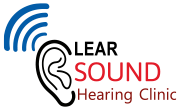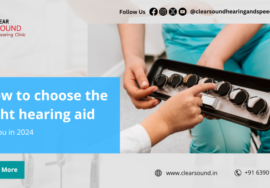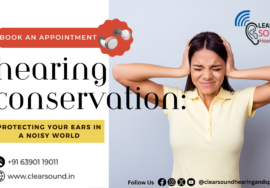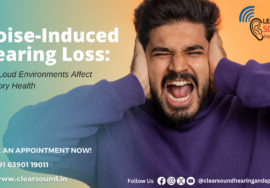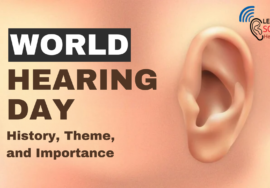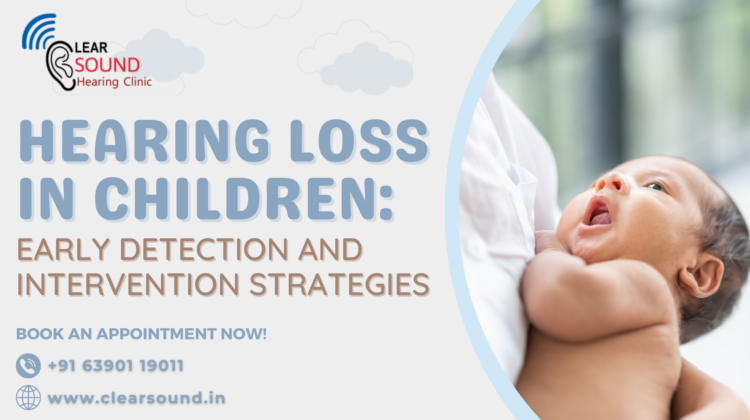
Hearing Loss in Children: Early Detection and Intervention Strategies
Are you aware that hearing loss is relatively common among children? About 1.9% of children have trouble hearing, and permanent hearing loss is found in more than 1 out of every 1,000 children. It is slightly more common among boys.
Not recognizing and treating it can seriously impact a child’s ability to hear and understand language.
In this blog, we will explore the causes and types of hearing loss in children, its impact, signs & symptoms, and the importance of early detection & treatment.
Causes & Types of Hearing Loss in Children
Hearing loss in children can be caused by a variety of factors, including genetic factors, congenital factors (present at birth), and acquired factors (occurring after birth).
Genetic factors account for approximately 50% of all cases of childhood hearing loss. Congenital factors influence hearing, with maternal infections during pregnancy or birth complications potentially affecting a child’s hearing. Acquired factors, such as chronic ear infections, can lead to hearing loss later in childhood if left untreated.
Impact of hearing loss…
Hearing loss in children is more than just a physical condition, it impacts their development and overall well-being.
One of the most significant impacts of hearing loss is on speech and language development. Children rely on hearing to learn and mimic speech sounds, which form the foundation for speaking language Without clear hearing, they may struggle to develop speech properly, leading to delays in language skills.
Emotional well-being is another area where hearing loss has an impact. Imagine the frustration a child feels when they cannot fully participate in conversations or activities due to their hearing loss. This can lead to feelings of low self-esteem, and even depression.
Signs & Symptoms…
Here are some common signs to watch for:
Infants (0-12 months)
- Does not react to loud noises
- Does not turn toward the source of a sound
Toddlers (1-2 years)
- Has delayed speech or unclear speech
- Does not respond when called by name
Children (3-5 years)
- Often asks for things to be repeated
- Shows signs of inattention or behavioral issues, which may be related to frustration from not hearing clearly
It’s important to note that these signs alone do not always confirm hearing loss, but they may indicate a need for further evaluation by an audiologist.
Early Detection of Hearing Loss…
Early detection of hearing loss is crucial for ensuring that children receive the required treatment they need to develop speech and language skills.
Below certain tests are commonly performed to know the type, cause, and degree of hearing loss
Otoacoustic Emissions (OAE) Test…
This test measures the sounds produced by the inner ear in response to sound. It is often used in newborn hearing screening and can help identify outer hair cell function, which is important for normal hearing.
Behavioral Audiometry…
For older infants and children, behavioral responses like turning their heads or raising a hand in response to sound are observed to assess hearing thresholds.
Auditory Brainstem Response (ABR)…
Electrodes are placed on the child’s head to measure the brain’s response to sound. This test is valuable for infants who cannot provide reliable behavioral responses.
Conditioned Play Audiometry (CPA)…
Children are taught to perform a specific play activity (e.g., placing a block in a bucket) in response to hearing a sound.
Tympanometry…
A probe is placed in the ear to measure the movement of the eardrum and the pressure in the middle ear, helping to identify issues like fluid in the middle ear.
Speech Audiometry…
Assessing a child’s ability to hear and repeat words or phrases at different volumes and frequencies can provide additional information about their hearing abilities.
Treatment for Children…
Hearing aids are commonly used to treat mild to moderate hearing loss, improving the child’s ability to hear speech and environmental sounds.
On the other hand, Cochlear implants are used for children whose hearing loss is severe enough that it cannot be managed with hearing aids.
To close
As a parent, being concerned about your child’s hearing health can make a significant difference in their hearing and language development, social skills, academic performance, and emotional well-being.
At Clear Sound, we are committed to providing comprehensive hearing solutions for children, ensuring they have every opportunity to develop their personalty and social skills.
Don’t wait until it’s too late to address your child’s hearing health.
